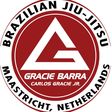Brazilian Jiu-Jitsu (BJJ) is a martial art and combat sport that emphasizes ground fighting and submission holds. Rooted in the principles of leverage, technique, and strategy, BJJ enables practitioners to control and overcome larger, stronger opponents. By focusing on joint locks, chokeholds, and positional dominance, BJJ has become a cornerstone of modern martial arts and a key discipline in mixed martial arts (MMA).
Brazilian Jiu-Jitsu was first developed around 1920 by Brazilian brothers Carlos, Oswaldo, Gastão Jr., George, and Hélio Gracie, after Carlos was taught traditional Kodokan judo by a travelling Japanese judoka, Mitsuyo Maeda, in 1917. Later, they marketed their own self-defense system based on Judo and named it Gracie Jiu-Jitsu. BJJ eventually came to be its own defined combat sport through the innovations, practices, and adaptation of Gracie Jiu-Jitsu and Judo, and became an essential martial art for modern MMA. Governing bodies such as the IBJJF work worldwide, and set the rules and standards to be held in sport BJJ competitions.
The Essence of BJJ
The philosophy of Brazilian Jiu-Jitsu revolves around the idea that technique can triumph over brute strength. This makes it an ideal martial art for individuals of all sizes and abilities. Practitioners train in the traditional gi (kimono), which introduces gripping techniques and a strategic approach to combat. BJJ is both a self-defense system and a sport, with a rich culture of respect, discipline, and camaraderie.
Key components of BJJ include:
- Positional control: Learning to dominate your opponent from positions like mount, guard, and side control.
- Submissions: Using joint locks and chokes to force an opponent to submit.
- Escapes and transitions: Developing the ability to move fluidly between positions and escape unfavorable scenarios.
Why Train Brazilian Jiu-Jitsu?
Training BJJ offers numerous benefits beyond learning to defend yourself:
- Physical fitness: Grappling builds strength, endurance, and flexibility.
- Mental resilience: The challenges of sparring teach patience, problem-solving, and perseverance.
- Community: BJJ academies foster a welcoming environment where people of all backgrounds come together to train and grow.
- Confidence: Knowing how to handle yourself in physical confrontations boosts self-esteem.
A Martial Art for Everyone
Brazilian Jiu-Jitsu is inclusive and adaptable, making it accessible to everyone, regardless of age or fitness level. Beginners learn foundational techniques and gradually progress, while advanced practitioners explore complex strategies and competitive opportunities.
Whether your goal is self-defense, fitness, or competing in tournaments, Brazilian Jiu-Jitsu offers a path to personal growth and mastery. Step onto the mats and discover the art of technique, strategy, and respect that defines BJJ.
Book your free trial class here!
